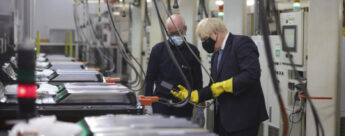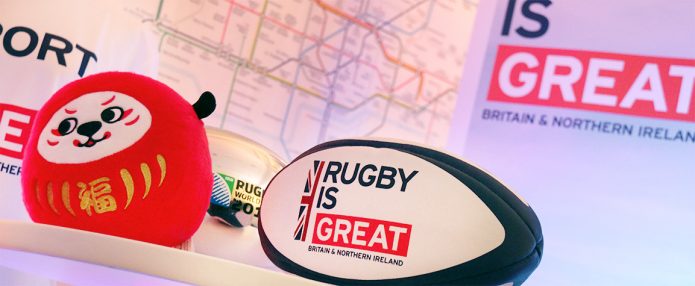I started as Deputy Trade Commissioner for North-East Asia (Japan, the Republic of Korea and Taiwan) at the British Embassy in Tokyo in August. I first moved to Japan in 2016 with my wife and two children, both of whom are in the British School in Tokyo.
My teams provide support to UK companies exporting to Japan and the wider region and to North-East Asian companies investing in the UK. We increasingly work hand in hand with those negotiating trade policy agreements, such as the UK–Japan Free Trade Agreement (FTA) and the Comprehensive and Progressive Agreement for Trans-Pacific Partnership (CPTPP) and on market access barriers.
We also work closely with our colleagues in the Devolved Administrations in Scotland, Northern Ireland and Wales, all of whom are now based at the British Embassy Tokyo, promoting trade and investment from all parts of the UK.
This is my second role at the British Embassy Tokyo having previously been the Head of Investment, where I supported Japanese companies to set up and grow in the UK.
Boosting trade and investment
There’s so much potential in the commercial relationship, it’s a great time to take on this role. Trade and investment between our two countries is already in a healthy position, despite the significant impact of the pandemic. Total trade in goods and services was £23.9bn toward the end of the first quarter of 2021, with UK exports to Japan (£12.2bn) and UK imports from Japan (£11.6bn) roughly equivalent. Japanese investment into the UK is also highly significant with a stock of £90.5bn, compared with the stock of UK investment into Japan of £5.2bn.
The UK–Japan FTA, which entered into force on 1 January, and the UK EU Trade and Cooperation Agreement (TCA), signed in December 2020, are bolstering opportunities for trade and investment. The UK Government ran the UK–Japan FTA campaign from March to July 2021, showcasing opportunities for UK exporters in a range of innovative webinars and other digital events. During the course of the campaign, we engaged with 1,100 UK companies and 1,240 Japanese companies, with at least 370 British companies introduced to Japanese buyers.
The TCA between the UK and the EU provided Japanese companies operating in the UK with increased certainty on the UK’s future trading relationship with the EU leading to an increase in confidence in the UK as an investment location.
A great example of this is Nissan Motor Corporation and Envision AESC announcement that they will be creating the UK’s first gigafactory to produce batteries for the automaker’s electric vehicles. There was a real sense of excitement and interest from UK companies about exporting to Japan. While it was recognised that Japan was not an easy market to break into, the high standards of quality and competitiveness were viewed as a positive challenge. UK companies with significant experience of trading with Japan felt the imperative to “up their game” and had improved their business. If you can make it in Japan, you can make it anywhere!
Trade policy
Of course, the UK’s ambitious trade policy in this part of the world does not stop with the signing of the UK–Japan FTA. The UK’s accession to the CPTPP continues to progress positively. On the UK–Japan FTA we are moving to implementation of the agreement, underpinned by a series of committees and working groups, which will act as the vehicles of implementation, enforcement and enhancement of the agreement.
We have identified specific areas, such as life sciences, food and drink, where we would like to cooperate further with Japan based on feedback from businesses. We are also keen to hear from any further British businesses with specific examples of where our trade policy could help improve access to the Japanese market.
AI, cybersecurity, fintech, digital
Technology and innovation is another area where there is real congruence between Japanese and UK businesses. The UK is world leading in areas including artificial intelligence, 5G cybersecurity, fintech and digital health, where UK universities and scale-up companies are carrying out cutting edge R&D and innovation. There is considerable scope for large Japanese blue-chip companies to gain a technological advantage by building partnerships with these UK businesses and universities.
The TCA between the UK and the EU provided Japanese companies operating in the UK with increased certainty on the UK’s future trading relationship with the EU leading to an increase in confidence in the UK as an investment location.

Prime Minister Boris Johnson visited Nissan Motor Corporation’s Sunderland plant in July. Photo: Nissan Motor Corporation
A great example of this is Nissan Motor Corporation and Envision AESC announcement that they will be creating the UK’s first gigafactory to produce batteries for the automaker’s electric vehicles. There was a real sense of excitement and interest from UK companies about exporting to Japan. While it was recognised that Japan was not an easy market to break into, the high standards of quality and competitiveness were viewed as a positive challenge. UK companies with significant experience of trading with Japan felt the imperative to “up their game” and had improved their business. If you can make it in Japan, you can make it anywhere!
Trade policy
Of course, the UK’s ambitious trade policy in this part of the world does not stop with the signing of the UK–Japan FTA. The UK’s accession to the CPTPP continues to progress positively. On the UK–Japan FTA we are moving to implementation of the agreement, underpinned by a series of committees and working groups, which will act as the vehicles of implementation, enforcement and enhancement of the agreement.
We have identified specific areas, such as life sciences, food and drink, where we would like to cooperate further with Japan based on feedback from businesses. We are also keen to hear from any further British businesses with specific examples of where our trade policy could help improve access to the Japanese market.
AI, cybersecurity, fintech, digital
Technology and innovation is another area where there is real congruence between Japanese and UK businesses. The UK is world leading in areas including artificial intelligence, 5G cybersecurity, fintech and digital health,
Financial services
There are ambitious aims to make Tokyo an international financial centre, while the Expo 2025 Osaka offers an opportunity to increase the profile and success of Osaka’s financial services industry.
The UK has been increasing its partnership with Japan over the past few years with the City of London Corporation and Tokyo Metropolitan Government signing a memorandum of understanding in December 2017 and bilateral trade in fintech has been increasing.
There’s clearly scope to increase this further through the annual dialogue, created as part of the UK-Japan FTA, between financial services regulators to further reduce regulatory friction. This framework will facilitate closer UK–Japan cooperation on financial services regulation in the future, supporting the reduction of market fragmentation and barriers, and increasing trade and investment.
It’s an exciting time to be at the fulcrum of UK–Japan commercial relations, with opportunities across a range of different areas. We look forward to seeing many more UK companies make a success of their business in Japan and to supporting Japanese investment in the UK.


 The world is reaching a crucial point
The world is reaching a crucial point 




